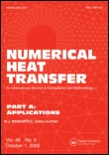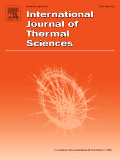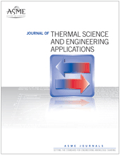
THERMAL ENGINEERING
Scope & Guideline
Advancing Energy Solutions for a Sustainable Future
Introduction
Aims and Scopes
- Thermal Systems Design and Optimization:
The journal emphasizes the design, modeling, and optimization of thermal systems, including power plants, heat exchangers, and combustion systems. This encompasses both theoretical and practical approaches to enhance performance and reduce operational costs. - Energy Efficiency and Sustainability:
A core aim is to explore advancements in energy efficiency across various thermal processes and systems. This includes studies on low-emission technologies, renewable energy integration, and methods to reduce greenhouse gas emissions. - Thermal Hydraulics and Heat Transfer:
Research in this area focuses on the mechanisms of heat transfer and fluid dynamics in thermal systems, including the study of two-phase flows, heat exchangers, and cooling processes in nuclear and fossil fuel power plants. - Nuclear and Thermal Power Technologies:
The journal covers a wide range of topics related to nuclear power plants, including reactor design, safety assessments, and innovative cooling methods, alongside traditional thermal power generation technologies. - Innovative Materials and Technologies:
Research on the development and application of new materials and technologies for thermal systems, such as advanced coatings, heat storage materials, and nanofluids, is frequently published, contributing to the enhancement of thermal efficiency.
Trending and Emerging
- Digitalization and Smart Technologies in Energy Systems:
There is a growing emphasis on the integration of digital technologies, such as smart sensors, data analytics, and AI, to optimize thermal systems and improve operational efficiency. - Carbon Capture and Utilization Technologies:
Research focusing on carbon capture, utilization, and storage (CCUS) technologies is gaining traction as industries seek solutions to mitigate climate change impacts and comply with regulatory frameworks. - Hybrid Energy Systems and Renewable Integration:
The development of hybrid systems that combine various energy sources, including renewables and traditional fossil fuels, is increasingly explored to enhance energy security and sustainability. - Advanced Materials for Energy Applications:
There is a notable trend in the exploration of advanced materials, such as nanomaterials and phase change materials, which can significantly improve the thermal efficiency and performance of energy systems. - Thermal Energy Storage Solutions:
Research on thermal energy storage, including latent and sensible heat storage technologies, is emerging as a critical area of focus to help balance supply and demand in renewable energy systems.
Declining or Waning
- Conventional Coal-Fired Technologies:
Research related to traditional coal-fired power generation technologies appears to be waning, as the focus shifts toward cleaner energy sources and technologies that align with global decarbonization goals. - Basic Thermodynamics and Classical Heat Transfer:
Papers that cover fundamental thermodynamic principles and classical heat transfer mechanisms have seen a decrease. This may indicate a transition towards more applied research emphasizing practical applications and innovations. - Low-Temperature Geothermal Energy:
While geothermal energy remains a relevant topic, studies specifically focused on low-temperature geothermal systems are less frequent, possibly due to the emergence of more advanced geothermal technologies and hybrid systems.
Similar Journals

Case Studies in Thermal Engineering
Elevating Knowledge in Thermal Engineering ExcellenceCase Studies in Thermal Engineering, published by ELSEVIER, stands as a premier platform for innovative research and analysis in the field of thermal engineering since its inception in 2013. With a robust Open Access model, this journal ensures that groundbreaking findings in fluid flow and transfer processes are readily accessible to a global audience, fostering collaboration and knowledge sharing across disciplines. Situated in the United Kingdom, the journal boasts an impressive impact factor, reflecting its status in the first quartile (Q1) for both engineering (miscellaneous) and fluid flow and transfer processes, as noted in the latest Scopus rankings. Researchers and professionals alike recognize its significance, ranking 9th out of 96 in Chemical Engineering and achieving a notable 91st percentile in its category. By publishing high-quality case studies, the journal aims to advance understanding and applications of thermal engineering principles, making it an essential resource for those looking to stay at the forefront of this dynamic field.

Archives of Thermodynamics
Advancing the Frontiers of Thermodynamic KnowledgeArchives of Thermodynamics is a reputable journal dedicated to the field of thermodynamics, published by the esteemed POLISH ACADEMY OF SCIENCES. With a robust history since its inception in 2003, this journal serves as a critical platform for disseminating high-quality research aimed at advancing knowledge and technology in thermodynamic systems and processes. Recognized for its contribution to the field, it holds a Q3 ranking in the Physics and Astronomy (miscellaneous) category as of 2023, with a respectable Scopus rank of #148 out of 243, placing it within the 39th percentile. Although it follows a traditional access model, the journal's commitment to scholarly excellence ensures that researchers, professionals, and students alike can benefit from its rich archives and ongoing discussions within the scientific community. Situated in Warsaw, Poland, the journal not only reflects a regional dedication to scientific progress, but also engages with global audiences interested in the evolving landscape of thermodynamic research.

Frontiers in Heat and Mass Transfer
Exploring Innovative Research in Heat and Mass TransferFrontiers in Heat and Mass Transfer is a premier open-access journal published by TECH SCIENCE PRESS that focuses on the interdisciplinary field of heat and mass transfer. Established in 2010, this journal has been pivotal in disseminating high-quality research aimed at advancing the understanding of energy and material transport phenomena. With an impressive commitment to open access, it ensures that all published articles are readily available to researchers, practitioners, and students globally, promoting knowledge sharing and collaboration. The journal currently holds a Q3 ranking in key categories such as Engineering, Materials Science, and Physics and Astronomy, as well as notable positioning in Scopus rankings. With a forward-looking scope extending from 2010 to 2024, Frontiers in Heat and Mass Transfer continues to be an essential platform for innovative research, fostering the development of practical applications across various scientific and engineering domains. We invite you to explore the latest contributions to this evolving field and consider this journal as a vital resource for your academic and professional growth.

JOURNAL OF ENGINEERING PHYSICS AND THERMOPHYSICS
Bridging Physics and Engineering for a Sustainable FutureJOURNAL OF ENGINEERING PHYSICS AND THERMOPHYSICS, published by Springer, is a vital resource for researchers and professionals in the fields of engineering physics and thermophysics. With an ISSN of 1062-0125 and an E-ISSN of 1573-871X, this esteemed journal has been disseminating high-quality research since its inception, covering critical advancements in both condensed matter physics and various engineering disciplines. Despite its classification within the third quartile in both Scopus categories for 2023, the journal remains a significant conduit for innovative studies that push the boundaries of knowledge in thermal and physical engineering, with converged years spanning from 1992 to 1997 and 2004 to 2024. The journal does not offer open access, which means subscribers and institutions have exclusive access to its rich content. As the field continues to evolve, JOURNAL OF ENGINEERING PHYSICS AND THERMOPHYSICS plays an essential role in fostering scholarly discussions and supporting the academic community in tackling contemporary engineering challenges.

International Journal of Heat and Technology
Exploring the Frontiers of Heat and Fluid DynamicsThe International Journal of Heat and Technology is a premier academic publication dedicated to the dissemination of innovative research in the fields of thermal engineering, fluid mechanics, and condensed matter physics. Published by the INT INFORMATION & ENGINEERING TECHNOLOGY ASSOCIATION and based in Italy, this journal has been a significant resource for researchers and professionals since its inception in 1983, with a commitment to advancing knowledge until 2024. With an impact factor that reflects its relevance, the journal encompasses diverse topics within its scope, bridging gaps between theoretical research and practical applications. Although currently not open access, the journal provides valuable insights into the nuances of heat transfer, flow dynamics, and material properties, making it a critical reference for academia and industry alike. The journal's Scopus rankings position it within the competitive landscape of chemical and mechanical engineering, highlighting its contribution to advancing these fields. We invite scholars, professionals, and students to engage with the rich content provided within its pages, to foster a deeper understanding of heat and technology in our rapidly evolving world.

NUMERICAL HEAT TRANSFER PART A-APPLICATIONS
Exploring innovative applications in condensed matter physics.NUMERICAL HEAT TRANSFER PART A-APPLICATIONS, published by TAYLOR & FRANCIS INC, serves as a premier outlet for cutting-edge research in the domains of numerical analysis and condensed matter physics. With an ISSN of 1040-7782 and an E-ISSN of 1521-0634, this esteemed journal has steadily maintained its influence in the academic community since its establishment in 1989, continuing its publication into 2024. Currently ranked in the Q2 quartile for both Condensed Matter Physics and Numerical Analysis, it stands as a vital resource for researchers committed to advancing computational methodologies and applications. The journal's Scopus rankings reflect its growing impact, particularly in mathematics, where it is placed in the top 26% of its category. Although not an open-access journal, its comprehensive research articles and detailed applications foster innovation and collaboration, making it essential for professionals and students aiming to deepen their understanding of thermal transfer phenomena through numerical techniques. This journal not only bridges theory and application but also propels forward the field of heat transfer.

INTERNATIONAL JOURNAL OF THERMAL SCIENCES
Fostering breakthroughs in thermodynamic principles.The INTERNATIONAL JOURNAL OF THERMAL SCIENCES is a premier academic journal published by ELSEVIER FRANCE-EDITIONS SCIENTIFIQUES MEDICALES ELSEVIER, focusing on cutting-edge research in the field of thermal sciences. With its ISSN 1290-0729 and E-ISSN 1778-4166, this journal has established itself as a crucial resource for scholars and professionals interested in the thermodynamic principles governing engineering and condensed matter physics. The journal is ranked Q1 in both Condensed Matter Physics and Engineering (miscellaneous), highlighting its exceptional quality and influence, as reflected in its impressive Scopus ranks: #32 out of 307 in General Engineering (89th percentile) and #57 out of 434 in Condensed Matter Physics (86th percentile). Researchers and students alike can benefit from the wealth of articles available, with access options designed to foster a wider dissemination of knowledge within the scientific community. Established in 1973 and ongoing through 2025, the journal invites contributions that advance the understanding of thermal phenomena and their applications, solidifying its importance in driving innovation and insight within these dynamic fields.

Computational Thermal Sciences
Unlocking New Insights in Computational Thermal DynamicsComputational Thermal Sciences, an esteemed journal published by BEGELL HOUSE INC, presents cutting-edge research at the intersection of computational mathematics, energy engineering, and fluid dynamics. With an ISSN of 1940-2503 and an E-ISSN of 1940-2554, this journal aims to disseminate high-quality research articles, reviews, and methodologies that improve our understanding of thermal processes and their applications. Renowned for its solid impact in the field, it holds a Q3 ranking in multiple categories including Computational Mathematics and Energy Engineering for 2023. As the field evolves, the journal continues to play a pivotal role in bridging theoretical research with practical innovations, thereby catering to a diverse audience of researchers, professionals, and students. Although it operates on a subscription model, the journal ensures accessibility to significant contributions in thermal sciences from 2009 to 2024, fostering an environment of knowledge sharing and collaboration.

Journal of Thermal Science and Engineering Applications
Connecting theory and practice in thermal engineering.The Journal of Thermal Science and Engineering Applications is a premier publication dedicated to advancing knowledge in the fields of thermal sciences and engineering applications. Published by the esteemed American Society of Mechanical Engineers (ASME), this journal has been contributing to the scientific community since 2009 and continues to be a platform for innovative research until 2024. With an ISSN of 1948-5085 and an E-ISSN of 1948-5093, the journal is recognized for its rigorous peer-review process and its impact within the scientific community. Notably, it has achieved notable rankings in various categories as of 2023, including Q2 in Engineering (miscellaneous) and Q3 in Condensed Matter Physics, Fluid Flow, and Transfer Processes, and Materials Science. This positions the journal favorably within its field, attracting submissions that reflect both theoretical and practical advancements. While it does not offer open access, its commitment to quality content ensures that it serves as a critical resource for researchers, professionals, and students interested in thermal sciences, engineering innovations, and related interdisciplinary studies. It is a must-read for anyone looking to stay informed on the latest developments and applications in these dynamic areas of research.

Journal of Power Technologies
Exploring Cutting-Edge Power SolutionsJournal of Power Technologies is a prestigious academic journal dedicated to advancing the field of power engineering, specifically focusing on innovative technologies and methodologies related to energy production, transmission, and efficiency. Published by the renowned Warsaw University of Technology, Institute of Heat Engineering, this journal is committed to disseminating high-quality research that addresses the challenges and opportunities in the energy sector. Although currently not open access, the journal provides extensive subscription options for access to its comprehensive range of articles. With an emphasis on original research, case studies, and reviews, the Journal of Power Technologies serves as a vital resource for researchers, practitioners, and students alike, aiming to shape the future of sustainable power systems and contribute significantly to the global energy discourse. The journal continues to foster an academic environment where innovation in power technology is highlighted and celebrated, supporting the ongoing quest for sustainable energy solutions.